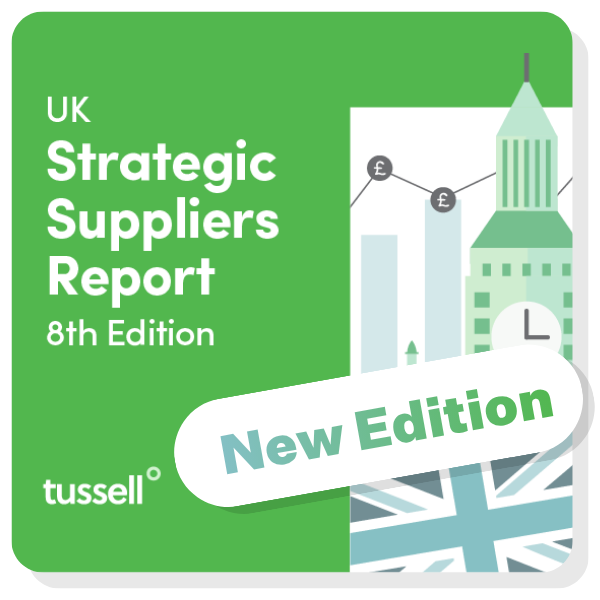On 21st October 2021 the Cabinet Office published its latest Procurement Policy Note, 08/21 Taking account of a bidder's approach to payment in the procurement of major government contracts.
The PPN represents the latest in a series of government endeavours to compel suppliers to pay companies in their supply chains more promptly.
This blog analyses how this latest PPN intends to do so, what it builds on, and what it means for you as a supplier.
💡 PPN 08/21: what's new?
PPN 08/21 updates last year's PPN 07/20 by increasing the threshold you have to meet to demonstrate you promptly pay companies in your supply chain when bidding on central government contracts worth over £5 million per year.
Specifically, if you don't pay a high enough proportion of invoices to companies in your supply chain within 60 days the circumstances under which you can still stake your case and bid on large contracts has been made more difficult.
From April 2022, if you've not met the required standard of paying at least 95% of all invoices in 60 days, you will still be able to pass the prompt payment assessment if you have paid "between 90% and 95% of all [your] invoices within 60 days in at least one of the previous two reporting periods", alongside providing an action plan for improvement.
This is an increase of the 85% - 95% leeway set in PPN 07/20.
To reflect this increase, if you've not paid at least 90% of supply chain invoices within 60 days in at least one of the two reporting periods, the bid automatically fails. This is an increase from at least 85% under PPN 07/20.
Unlike PPN 07/20, this update does not apply to NHS Trusts or to devolved contracting authorities in Scotland, Wales and Northern Ireland.
PPN 08/21 also includes added guidance on how you should correctly report their payment data where supply chain finance is used, the details of which are provided in Question 9 of the PPN's FAQ's.
🤔 What's stayed the same?
Other than this, the underlying methodology of the PPN remains largely the same as its previous iteration.
Broadly speaking, both PPN 07/20 and PPN 08/21 require you to submit information on how promptly you pay invoices to companies in your supply chain when bidding on central government contracts worth over £5 million per year. Contracting authorities then assess whether you are a prompt enough payer, giving you the opportunity to explain and/or address slow payments before being permitted to bid on the contract. If the proportion of invoices you pay promptly is below a given threshold, you are excluded from bidding on the contract.
If you have paid 95% or more of your supply chain invoices within 60 days in at least one of the last two six month periods, you pass. You can also pass under the same criteria if "intercompany payments" are removed.
If you have - as of PPN 08/21 - paid between 90% to 95% of invoices under the same criteria, you must provide an "action plan" identifying why they failed to meet the threshold, and what they intend to do to rectify it. If the plan is sufficient, you also pass.
If you have - as of PPN/08/21 - paid under 90% of invoices under the same criteria, your "payment performance falls substantially below the required standard", and the bid automatically fails.
Both PPN 08/21 and 07/20 apply to "Central Government Departments, their Executive Agencies and Non Departmental Public Bodies".
More details on the assessment process - including how it applies to framework call-offs - can be found in the PPN's guidance document.
🎯 What is the PPN trying to achieve?
PPN 08/21 represents the latest push by the government to get larger suppliers to pay those in their supply chains more promptly. Delayed payments cause damage throughout supply chains, hampering the ability of smaller firms to sufficiently plan and grow.
Untimely payments have long been an issue, but government efforts to address them over recent years has brought some real results.
Our 2020 report on prompt payment in supply chains demonstrated that policies since 2018 had improved payment practices amongst some of the government's biggest suppliers. From 2018 - 2019, the proportion of government spend with firms which paid 95%+ of invoices within 60 days increased from a third to more than a half. Compliance amongst larger firms earning >£100m - such as the Strategic Suppliers - increased by nearly a third.
Amping up the pressure on bidders to proactively improve their payment practices proved successful, and we ultimately recommended that the government pushed further in due course.
PPN 08/21 further tightens the pressure on non-compliant bidders by reducing the leeway given to those that fall below the expected 95% invoice threshold. The fact that the PPN does not apply to NHS Trusts potentially reflects preliminary data we identified in our report, suggesting that the COVID-19 pandemic detrimentally affected health-related suppliers' abilities to promptly pay their supply chains.
This aside, the PPN represents yet another incremental step towards eradicating poor payment practices.
🚨 What does this mean for you?
If you're a larger supplier looking to bid on large government contracts, this latest PPN only further demonstrates how important good payment practice will be in securing contracts.
The already high threshold has been pushed even higher, so now has never been a better time to identify issues within your supply chain payment process, and proactively take steps to rectify them. After all, the threshold may be tightened even further over the coming years.
Even if you're a smaller supplier who isn't planning on bidding for larger government contracts, performing best practice now will ensure you're in a good position if and when you do. The government may also lower the minimum value of contracts to which such prompt payment assessments apply, so ensure you're prepared ahead of time.
If you subcontract regularly with larger suppliers, prompt payments are a decisive factor when choosing who to do business with. This latest PPN should hopefully encourage more companies to proactively improve their payment practices, in turn increasing their - and your - chances of winning business.
To understand how the prompt payment landscape has changed over the past few years, read our 2020 report!
*
Read all of our PPN summaries here:
- PPN 08/23: Using the Standard Contracts
- PPN 07/23: Government Security Classifications Policy 2023
- PPN 05/23: Implementing new Free Trade Agreements
- PPN 01/23: Requirements to publish on Contracts Finder
- PPN 06/21: Taking account of Carbon Reduction Plans in the procurement of major government contracts
- PPN 05/21: National Procurement Policy Statement
Want these summaries sent straight to your inbox? We send out guides, explainers, reports aimed at helping you sell more to government every two weeks. Sign up for our biweekly supplier newsletter here!




%20v1.png)


-1.png?width=1280&height=800&name=Copy%20of%20LinkedIn%20+%20Twitter%20Link%20Posts%201200%20x%20628px%20(3)-1.png)
.png?width=80&height=80&name=james%20v2%20(1).png)



